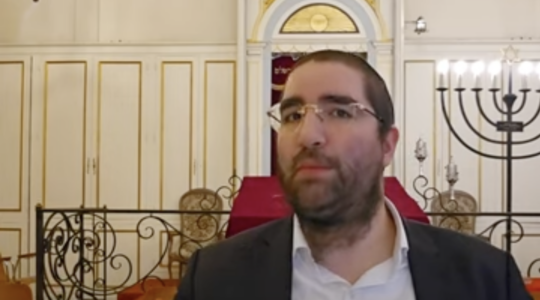(JTA) — Tributes and statements of profound respect and admiration are pouring in for Elan Steinberg, former executive director of the World Jewish Congress, who died April 6 of complications from lymphatic cancer. He was 59.
"Elan’s premature death will leave a huge void in the Jewish world," said WJC President Ronald Lauder, who called Steinberg one of the "greatest Jewish activists" of the past decade. "He was deeply committed to advocating the rights of the Jews around the world and of Holocaust survivors in particular. He was probably the most gifted communication professional in the Jewish organizational world."
Steinberg helped organize the research, hearings, media campaign and eventually the lawsuit that forced Swiss banks to agree to pay $1.2 billion to compensate Holocaust victims and their descendants. In the aftermath of that action, European governments, insurance companies and other organizations also began payments.
Columnist Isi Liebler described the effort as Steinberg’s "most impressive contribution" to the Jewish people and said his "premature death represents an irreplaceable loss to world Jewry."
Born in Rishon Lezion, Israel, on June 2, 1952, to Holocaust survivor parents, Steinberg grew up in Brooklyn, N.Y., and received a master’s degree in political science from the City University of New York.
He joined the WJC in 1978, rising to become world executive director. He left the organization in 2004 in protest against financial irregularities there. He later became senior adviser to Lauder, as well as vice president of the American Gathering of Jewish Holocaust Survivors and Their Descendants.
Among his accomplishments at the WJC, Steinberg initiated a campaign challenging former United Nations Secretary-General Kurt Waldheim over his Nazi associations when he was running for the Austrian presidency, and persuaded the Vatican and Spain to recognize Israel.
Steinberg also pushed the opposition to a Carmelite convent at Auschwitz and convinced filmmaker Steven Spielberg not to film scenes for "Schindler’s List" at the Nazi death camp.
Steinberg’s approach to those issues changed the way Jewish organizations worked with and pressured world governments and agencies.
Noting that the WJC had been seen as the "greatest secret of Jewish life" with its quiet diplomacy, Steinberg said he brought "a newer, American-style leadership — less timid, more forceful, unashamedly Jewish."
Yet even some of the Jewish world’s most outspoken leaders sometimes questioned Steinberg’s approach.
Simon Wiesenthal questioned the anti-Waldheim campaign, saying Waldheim was an "opportunist," not a war criminal. Abraham Foxman, the Anti-Defamation League’s national director, told The New York Times that while he supported WJC’s "persistence" on the Swiss compensation, he worried that the Swiss might begin to see Jews as their enemy because the campaign "fed into the stereotype that Jews have money, that it’s the most important thing to them."
Writer Douglas Bloomfield said Steinberg’s goal with the Swiss banks was not only money.
"He would say that the real goal of the campaign was moral as well as material restitution — justice for the victims, for the survivors and for their families," Bloomfield wrote.
In a statement read at Steinberg’s funeral, Nobel laureate Elie Wiesel said, "Whenever Jews were in danger or Jewish honor offended, he vigorously yet elegantly spoke up. Whenever Jewish memory was attacked, he attacked the attacker."
Steinberg is survived by his wife, Sharon, and three children, and a brother.
JTA has documented Jewish history in real-time for over a century. Keep our journalism strong by joining us in supporting independent, award-winning reporting.





